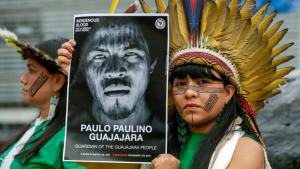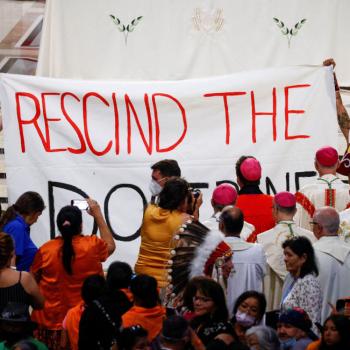
Last fall’s Synod on the Amazon made clear the difference between Catholic and some evangelical mission approaches. (See this post on the Amazon Synod.) Catholic and mainline Protestant missionaries see God at work in indigenous cultures. They want to preserve what is good in them. Fundamentalist evangelicals, however, see these cultures as dark places and their people as “lost.” These fundamentalist groups are now in a new position of power in Brazil. The Catholic Church in Brazil and indigenous people both see a potentially murderous threat in a recent move by the Jair Bolsonaro government. He has appointed a former evangelical missionary, Ricardo Lopes Diaz, to head Brazil’s Department for Isolated and Recently Contacted Tribes. An article in The Guardian reported this newest anti-native move of Bolsonaro’s.
Amazon tribes have long feared that Bolsonaro “wants to destroy us.” This destruction would happen not by any military or police action but by inaction. Bolsonaro has simply stopped enforcing laws that have protected indigenous peoples and their lands. Powerful mining and agricultural interests invade lands established for indigenous peoples. The results are the spread of diseases to native people who chose to be isolated and destruction of the rainforests on which they depend.
Religious/political alliance
Bolsonaro’s attitude toward indigenous peoples is essentially a secular version of what conservative evangelicals believe. The latter “demonize indigenous cultures, spirituality and traditions.” (CRUX article quoting Cleber buzatto of the Brazil bishops’ Indigenous Missionary Council) Bolsonaro compares indigenous people to monkeys. He says, condescendingly, they are “increasingly becoming human beings just like us.”
An indigenous leader says evangelical missionaries destroy indigenous peoples’ “cosmological and ethical” belief systems. In their place they offer a “prosperity gospel,” according to the CRUX article. Traditionally Amazon people supported one another, a lifestyle Catholic missionaries compared to that of the Christian communities. Now evangelicals urge “commercial initiatives” and “financial ambitions.” People’s “very existence as indigenous groups is in jeopardy,” Buzatto says.
Bolsonaro gets crucial political support from evangelical groups and repays them with a show of support for conservative Christian morality. Both the politics and the morality, for different reasons, leave the environment out of the picture. Bolsonaro cares most about the monetary wealth that indigenous lands represent. He says they have too much land. Conservative evangelicals expect God to put an end to this world in the near future. Long-term environmental sustainability has no place in that picture.
New Indigenous fears as Bolsonaro puts Lopes Diaz in charge
There are 107 tribes in Brazil which have chosen to isolate themselves. Lopes Diaz in his new position will have detailed information on all of them, The Guardian reports. In the past these groups have been “decimated by diseases like measles and flu after coming into contact with evangelical missionaries, government employees and outsiders.”
The Guardian continues:
Between 1997 and 2007, Dias worked as a missionary … for the controversial group New Tribes Mission, who pledged to convert every last “unreached people group” on earth. …. “I’ve been in these tribes and at times you can feel this incredible, intense darkness. But you know what I found? No darkness is too dark for God,” [New Tribes Mission] CEO Larry Brown says in a video on its website.
The process of evangelicals contacting remote tribes has begun already, indigenous experts say, according to the Guardian article.
Image credit: Euractiv











